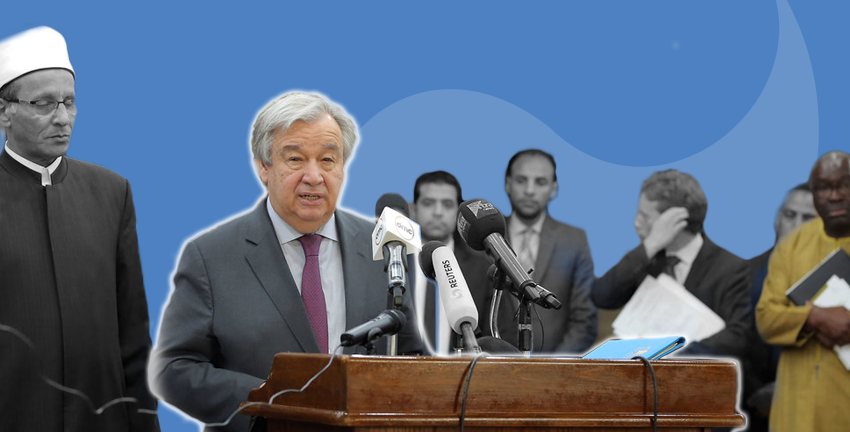
Minorities
Inclusion
NOT Stereotyping
UN Action
Minority issues have been on the agenda of the United Nations for more than 60 years. Already in 1948, the General Assembly declared that the United Nations could not remain indifferent to the fate of minorities.
The 2005 World Summit outcome reaffirmed the importance of minority rights’ protection and promotion to the work of the United Nations, stating that:
"[T]he promotion and protection of the rights of persons belonging to national or ethnic, religious and linguistic minorities contribute to political and social stability and peace and enrich the cultural diversity and heritage of society.”
Declaration of rights – a main point of reference
In 1992, the General Assembly adopted the UN Declaration on the Rights of Persons Belonging to National or Ethnic, Religious and Linguistic Minorities (A/RES/47/135), which is the main point of reference for the international community regarding the rights of minorities.
2022 marked the 30th anniversary of the adoption of the Declaration on Minority Rights. The United Nations convened a High-Level meeting on minorities to mark this occasion, and the Secretary-General delivered his remarks.
Spotlight: Bias and racism
World falling ‘far short’ of pledge to protect minority rights: Guterres
Institutional suspicion and fear of Muslims has escalated to epidemic proportions
Bias, racism and lies: facing up to the unwanted consequences of AI
Campaigning against Anti-Semitism: Online to Offline
 UN Secretary-General underscored the need to fight Islamophobia and all forms of hatred and bigotry
UN Secretary-General underscored the need to fight Islamophobia and all forms of hatred and bigotry©UN Photo/Mahmoud Abd ELLatiff
International Covenant and other initiatives
The Declaration was inspired by Article 271 of the International Covenant on Civil and Political Rights, which is the most widely accepted legally binding provision on minorities.
In 2005, the Independent Expert on minority issues was appointed to promote the implementation of the 1992 Declaration.
In 2007, the Forum on Minority Issues was established to provide a platform for promoting dialogue and cooperation in that field as well as thematic contributions to the work of the Independent Expert.
Spotlight: UNESCO and OSCE
Addressing anti-semitism in schools
UNESCO and OSCE launched the framework curricula for teacher trainers to address anti-semitism in schools. See their policy guide for addressing anti-semitism through education
Durban Declaration and Programme of Action
Consistent with the provisions of the 1992 Minorities Declaration, the 2001 Durban Declaration and Programme of Action urged Governments to create favourable conditions and take measures that would enable persons belonging to minorities within their jurisdiction to express their characteristics freely and to participate on a non-discriminatory and equitable basis in the cultural, social, economic and political life of the country, in which they live.
Diverse Police Force – DDPA recommendations
The Durban Programme of Action specifically calls for the creation and implementation of policies that promote a high-quality and diverse police force free from racism, racial discrimination, xenophobia and related intolerance.
One of the Programme’s recommendations is that in recruiting for public employment, including the police force, States ensure the participation and representation of all groups including minorities.
States are also urged to design, implement and enforce effective measures to eliminate the phenomenon of ’racial profiling.’
Where are we?
Although the rights of persons belonging to minorities are being increasingly recognized as an integral part of the anti-discrimination agenda of the international community, much remains to be done to achieve the true meaning of living in dignity and justice, free of racism – as inscribed in the motto for the 2009 Review Conference.
COVID-19 Pandemic
In a statement at the Human Rights Council briefing on COVID-19 (2020), Michele Bachelet, UN High Commissioner for Human Rights said:
The COVID-19 pandemic is exposing the damaging impact of inequalities, in every society. Several high-risk and vulnerable groups, including minorities require greater attention, and mitigation measures, at this time.
When an existential threat faces all of us, there is no place for nationalism or scapegoating – including of migrants and minority communities. There have been growing, and unacceptable, physical and verbal attacks on people of East Asian origin, and members of other minorities, and action should be taken to combat this.
Secretary-General @antonioguterres is profoundly concerned about the rise of violence against Asians and people of Asian descent during the #COVID19 pandemic.
— UN Spokesperson (@UN_Spokesperson) March 22, 2021
He stands in solidarity with all those who face racism & other assaults on their human rights: https://t.co/K42UhCRBOf
Links
Human Rights
Minorities
- Minorities (OHCHR)
- Minorities under international law
- International Covenant on Civil and Political Rights
- Combating Discrimination against Minorities
- Independent Expert on minority issues
- Forum on Minority Issues
- COVID is “a colossal test of leadership” requiring coordinated action, High Commissioner tells Human Rights Council - Statement by Michelle Bachelet, UN High Commissioner for Human Rights
Documents
- Minority Rights: International Standards and Guidance for Implementation
- General Assembly Resolution A/RES/47/135 - Declaration on the Rights of Persons Belonging to National or Ethnic, Religious and Linguistic Minorities
- Durban Declaration
- Publications by OHCHR Indigenous Peoples and Minorities Section
